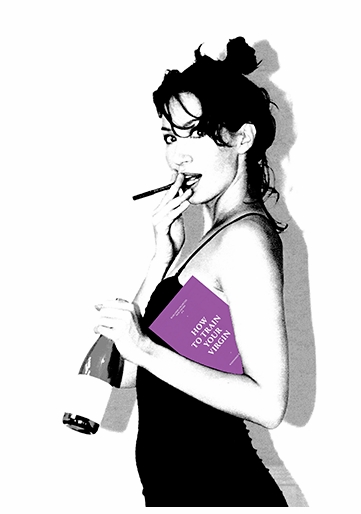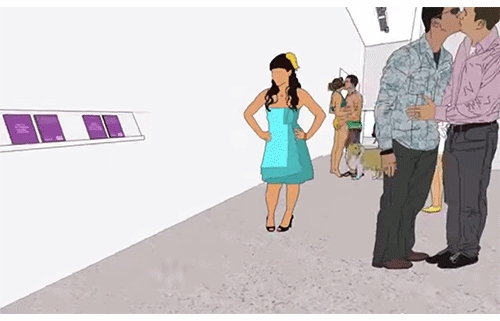| RECENT POSTS DATE 4/10/2025 DATE 3/31/2025 DATE 3/29/2025 DATE 3/29/2025 DATE 3/27/2025 DATE 3/27/2025 DATE 3/20/2025 DATE 3/20/2025 DATE 3/18/2025 DATE 3/16/2025 DATE 3/15/2025 DATE 3/14/2025 DATE 3/13/2025
| | | MADELINE WEISBURG | DATE 3/9/2015Tuesday, March 10 at 7PM, Paul Chan and Badlands Unlimited launch the New Lovers erotic book series at the Guggenheim Museum as part of Nonprojections for New Lovers, Chan's Hugo Boss Prize exhibition. In celebration of the series and the event, Madeline Weisburg spoke with Wednesday Black, author of How to Train Your Virgin.
ABOVE: Wednesday Black
MADELINE WEISBURG: How to Train Your Virgin is your first work of erotic fiction. What brought you to this genre, and how did you come to work with Badlands Unlimited—a press that's normally associated with art publishing and the work of Paul Chan?
WEDNESDAY BLACK: Last summer a fellow writer asked whether I wanted to write an erotic novella for Badlands' New Lovers series. Erotica? Me? At the time, I was laboring away at my first novel and casting about for any reason to take a break. And I was intrigued by the idea that an arts publisher wanted to cultivate new voices in sex writing.
Every woman has her own complicated take on sex and sexuality. Why not add my strange, small voice to the exploratory chorus? So I sat down as Wednesday Black and typed How to Train Your Virgin. It poured out of me, kind of renewing my sense of flow, because I could write it to impress no one. It was liberating to write about fantasy material like mating mermaids and cute creatures and then twist the story towards subjects that are serious and real: the failing of a long-term relationship, the onset of ennui, the dark sexual aggression we carry within us, the lengths we will go.
Writing Virgin refreshed me. That kind of freedom flushes out the pipes. Critics are necessary, but they don’t belong in our heads while we’re writing.
MW: Your title alludes to funny, more slapstick elements in the book. What's the role of humor in your work?
WB: The title arrived first, a stroke of luck as it contained silliness and a readymade story arc—something I always struggle with in my work. Humor plays a part in how I handle many things, from grief and disappointment to love and sex. I mean, think about what you’re doing when you have sex—it’s hilarious! Romance, especially romance-gone-wrong, needs comic relief too. I found I could convey my Queen’s anguish precisely because there are liveried squirrels and X-rated carousels, because the solution that she hits upon to save her marriage is preposterous and probably illegal.
MW: Paul, and Badlands, are known for their openness to experiment and sense of humor as well.
WB: They do have a sense of humor! One of my manuscripts came back with Track Changes authored by Dick Cheney. “This is too sentimental,” he wrote of my first ending, “try again.” And I knew I had arrived in a strange land indeed when my copyeditor posed the question, very seriously, “Does a pussy heave or does it more pulsate?”
MW: Your book is among the first in Badlands’ New Lovers series, which pays tribute in concept and design to the legendary French publishing house, Olympia Press—the first to publish Nabokov's Lolita, William S. Burrough's Naked Lunch, and many other books of transgressive writing by people like Henry Miller, Georges Bataille and, of course, the Marquis de Sade—a figure who shows up regularly in Paul's work. You must be pleased with this relationship!
WB: I wasn’t initially aware that Badlands created New Lovers as a tribute to Olympia Press, but it was a thrill to discover. I’ve read a few Olympia titles over the years, starting with a battered copy of The Story of O that I unearthed from a bookstore bargain bin at the age of 14. I was not ashamed to hand that nondescript paperback to the clerk to pay. I didn’t suspect anything prurient; the book had class. The opening pages seemed beautifully written, stately even. That day I went home and found my clitoris.
MW: Do you read erotica yourself? Any preference between written or visual pornography?
WB: I don’t do visual pornography. To me, there’s nothing humorous or sweet there, just gray lifelessness. I do read a little literary pornography, although it’s hard to find the great stuff in the sheer volume out there. That's one reason the New Lovers series is important—it helps readers find writers who are serious about their craft. The Best Women’s Erotica series is a well-curated volume of shorts stories.
MW: Why write under a pseudonym?
WB: Many writers use different names across genres just to avoid confusion. I’d hate for readers to mistake a novel I’m working on now, which is about a mother and daughter who work in the New York City sex industry, with a fantasy containing copulating grass-people. Only one of these stories functions as erotica.
On the other hand, I don’t think I should have to hide behind a pseudonym, or even that it’s good to do so. Why surrender to the notion that a respectable woman or a real writer can’t/shouldn’t/won’t write fiction designed to titillate? Is female sexuality so distasteful? I hate to bow to the trend of slut-shaming by hiding behind the name Wednesday Black, so I haven’t been entirely cloak-and-dagger about my true identity either. And you know what? I've been surprised to realize that, among many of my enlightened peers, the idea persists that nice girls don’t write (or read) erotica. Along with a flood of support, I’ve also fielded some interesting backhanded compliments: “I don’t read porn,” “this is actually good,” or “I liked it but it wasn’t really a turn on.” It’s been surprising how many sophisticated readers have felt compelled to voice their disclaimers, to loudly distance themselves from sexual content.
MW: I almost hate to mention this, but the release of your book is timed perfectly with the Fifty Shades of Grey movie (directed by artist Sam Taylor Johnson). In the New York Times, A.O. Scott suggests that the most “useful” aspect of the originating book series is that its overwhelming success destigmatizes certain sexual practices by “planting them in the soil of Anglo-American banality”—the airport bookstore, reading groups across the nation, the hands of passengers on the New York City subway. This brings me to the question of context. How to Train Your Virgin is published by an artist, distributed through an art book distributor, and launched last week at the Guggenheim Museum as part of Nonprojections for New Lovers, Paul Chan's Hugo Boss Prize show. Can you reflect on the relationship between context and content here?
WB: Either the mainstream dismisses female pleasure outright, or, as we’ve seen with the furor over 50 Shades, it generalizes, ridicules or utterly misunderstands it. I believe Badlands, in its position as an iconoclastic arts publisher with a sophisticated readership, is trying to bring fresh, articulate voices into the conversation to broaden exposure to the intricate workings of female sex and sexuality one small voice a time. The message is that female pleasure is not only acceptable, it’s multifarious, its irresistible, it’s awesome and it’s coming up in the world.
MW: Badlands describes the mythical world that you create as Game-of-Thrones-meets-Lady-Chatterley's-Lover. Such mass/high culture references are not unusual for erotica, a category which encompasses everything from Marquis de Sade to ‘70s paperback genre fiction. What’s your take on the muddied distinctions between pulpy potboiler and literary novel in erotic fiction?
WB: I laughed so hard when Paul told me that. I’m flattered by the references to Game of Thrones and Lady Chatterley, especially as I hadn’t seen Game of Thrones when I wrote Virgin. Now that’s dirty—and so fun!
I think these distinctions are natural and useful: they shape the reader’s expectations. They also seem to serve another, more conciliatory purpose: reassuring the reader that he/she doesn’t have to feel ashamed for reading erotica because "It’s not just porn, old chap.” It makes the porn aspect more palatable, like Mary Poppins’ spoon full of sugar.
MW: All of books in the New Lovers series are written by women. Why?
WB: Who knows what lurks in the minds of Paul Chan and Badlands Unlimited! It’s fun and maybe a little bit risky that they are foregrounding female voices in erotic fiction, whatever their motivations. To me, Badlands' move to publish erotic works, to display them as part of Paul's Hugo Boss exhibit—all that is art in itself: art that includes and celebrates women’s erotic fiction, yes, but art that also gently urges us to avoid taking anything too seriously, especially ourselves. Sex writing for women and by women doesn’t have to be all serious and somber. It can be a bucket of laughs, and I think Badlands was drawn to writers who were able to poke fun at themselves (while also enjoying themselves). After all, they are selecting books with titles like How to Train Your Virgin and We Love Lucy. And you know what? Sometimes a sexy, smutty book is just a sexy, smutty book. It doesn’t have to be written in some prescribed voice or style to have value or relevance.
WEDNESDAY BLACK is a writer of fiction, nonfiction and poetry. She studied writing at the University of Michigan in Ann Arbor, where she spent part of her childhood, and at the New School in New York City. She splits her time between New York and New Orleans. How to Train Your Virgin is her first work of erotic fiction.
MADELINE WEISBURG is an artist and sales associate at ARTBOOK | D.A.P.
ABOVE: A still from Paul Chan's promotional rendering of "Nonprojections for New Lovers" at the Guggenheim.
To read more, see Paul Chan's March 6 interview on artnews.
| |
|


